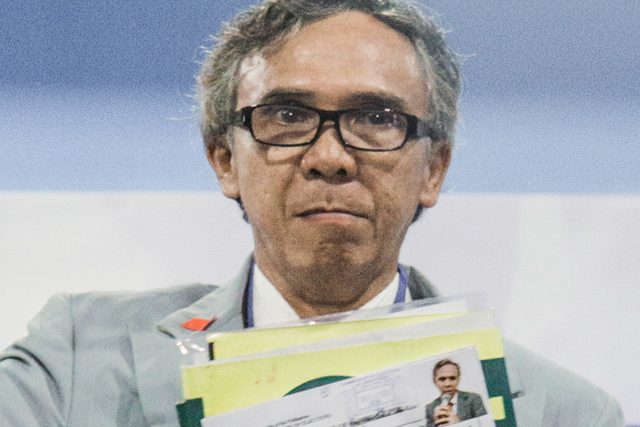
The self-proclaimed—that is, imagined—husband of Kris Aquino was unfazed when he filed his candidacy for senator in next year’s mid-term polls despite several failed attempts in previous years.
Magtira sought to run twice in the past, including for the post of president, but the Commission on Elections disqualified him as a “nuisance candidate.”
In the previous elections in 2013 and 2016, quirky and unexpected political aspirants like Magtira have become social media sensations as they file for candidacies.
Catching the attention of reporters covering the event, some of these candidates readily offered outrageous policy proposals to anyone who dared ask or perform song or dance numbers in front of television cameras.
The circus of a COC filing
The Constitution allows anyone who is a natural-born Filipino who is at least 35 years of age and is able to read and write to run for Senate. Candidates should also be registered voters and a resident of the Philippines for at least two years on the day of the election.
If the Constitution is to be followed, millions of Filipinos who dare march into the halls of the Commission on Elections with their notarized forms these days could run for senator.
Some are not particularly warm to the idea.
Again, I struggle on whether nuisance candidates, no matter how irritating, are enough of a public threat to warrant coercive measures of restraint by the State. https://t.co/b401mJjGTc
— oli r. (@ohlistic) October 11, 2018
Mas marami pa yun NUISANCE CANDIDATES! Trying to get a share of limelights & instant media publicity.
Kaya no wonder kenkoy ang palakad ng Gov't natin.Gov't must ammend the law & COMELEC candidate selection policy!@MayDPoresBeWidU @EstelleSelfie @serrano_rene @rapplerdotcom pic.twitter.com/TXkXgXQ4xz
— zaldy torres (@zaldytor) October 11, 2018
The Comelec, however, further screens those who filed their applications to check whether they are nuisance candidates. The criteria applied are stated in Section 69 of the Election Omnibus code.
This means not all hopefuls who filed certificates are allowed to campaign and take their chances to be lawmakers in the upper chamber of Congress.
The Comelec, by virtue of motu propio or on its own, can cancel a person’s certificate for the following:
- The candidate filed the certificate to put the election process in mockery or disrepute
- Candidates tries to cause confusion among the voters by the similarity of the names of the registered candidates or by other circumstances.
- The candidate has no bona fide intention to run for the office.
At times, the Comelec also asks candidates to prove that they are capable of launching a national campaign.
In 2016, Comelec spokesperson James Jimenez explained that the poll body listens to the candidates first before dismissing them as nuisance.
“There are also some questions to the ability of the candidates to conduct national campaigns. Nuisance refers to the candidacy, not the individual,” Jimenez said.
He also added that the acceptance of certificates of candidacy is “ministerial” or part of Comelec’s administrative task. But it does not mean that all who filed will be given a green light to campaign for elections.
It’s not ‘onli in da Pilipins’
Allowing private citizens—including those with absurd platforms—to seek an elective post is a characteristic of election processes in other countries.
In the United States, performance artists, rock stars, convicted felons and other people were allowed to run as candidates but they would eventually drop out during the election.
The general requirement for political hopefuls is to designate a “campaign committee” with at least $5,000 to spend for the campaign.
Daniel Magtira, who admits he still loves Kris despite being estranged with her, said he will advocate for Pinoy rock should he win a Senate seat. It is likely that he will again be disqualified as a nuisance candidate unless he proves he could mount a campaign to reach voters who know Kris Aquino.









